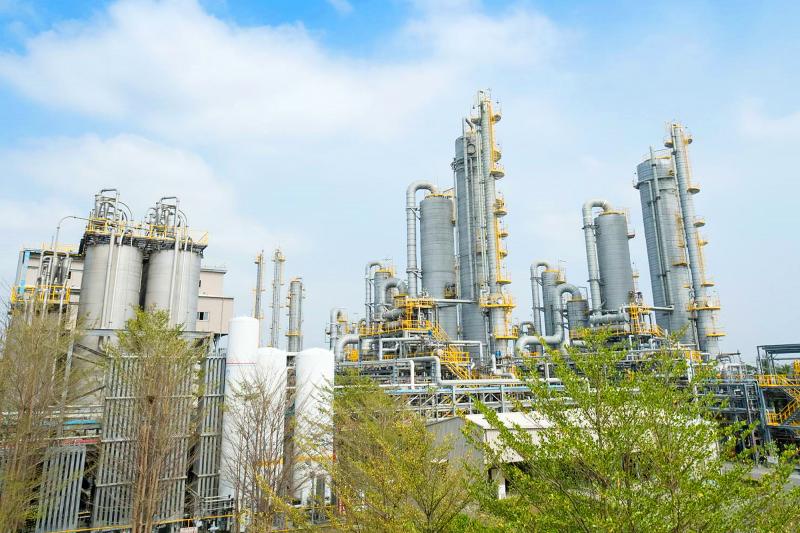Manufacturing output last quarter rose for a sixth straight quarter given growth in global end-market demand, development of emerging technologies, digital transformation and improvement in supply chain disruptions, the Ministry of Economic Affairs said yesterday.
Rising costs of international raw materials due to Russia’s invasion of Ukraine also helped push output of the local manufacturing sector upward in the first quarter, the ministry said in a statement.
Manufacturing output increased 16.01 percent year-on-year to NT$4.16 trillion (US$139.74 billion), the highest number on record for the January-to-March period, the ministry said.

Photo courtesy of Chi Mei Corp via CNA
The increase last quarter was led by the electronic components industry — the manufacturing sector’s most important segment — which climbed 16.9 percent to NT$1.27 trillion, the highest ever for the period, it said.
Semiconductor production grew 28.74 percent to NT$622.9 billion, as demand for chips used in 5G, high-performance computing, the Internet of Things and automotive applications remained strong, the ministry said.
However, LCD production posted an annual decrease of 5.24 percent to NT$203.2 billion given lower panel prices compared with a year earlier, it added.
Output from the computer, electronics goods and optical components industries expanded 19.03 percent on an annual basis to NT$235 billion on the back of increased production of servers, solid-state drives and networking equipment to meet robust demand for cloud computing services, the ministry said.
Traditional industries such as base metals, chemical materials, petroleum and coal experienced rises in output of 22.15 percent, 12.91 percent and 39.48 percent respectively to NT$459.9 billion, NT$514.9 billion and NT$242.2 billion last quarter from a year earlier due to higher international raw material costs, the ministry said.
As orders increased in semiconductor, automation equipment and 5G-related industries, the machinery equipment industry’s output rose 14.46 percent to NT$194.3 billion last quarter, it said.
However, automobile and auto parts output declined 0.83 percent to NT$96.6 billion, as domestic automakers faced persistent shortages of components and tougher emissions regulations on diesel-powered trucks, it said.
The ministry said it is positive about the outlook for the manufacturing sector, as companies continue to develop new technologies, chipmakers prepare to expand capacity and major economies implement infrastructure projects.
However, growth headwinds lie ahead for the sector, the ministry said, citing supply chain bottlenecks, sea port congestion, the COVID-19 pandemic, lockdowns in China and the war in Ukraine.

Vincent Wei led fellow Singaporean farmers around an empty Malaysian plot, laying out plans for a greenhouse and rows of leafy vegetables. What he pitched was not just space for crops, but a lifeline for growers struggling to make ends meet in a city-state with high prices and little vacant land. The future agriculture hub is part of a joint special economic zone launched last year by the two neighbors, expected to cost US$123 million and produce 10,000 tonnes of fresh produce annually. It is attracting Singaporean farmers with promises of cheaper land, labor and energy just over the border.

US actor Matthew McConaughey has filed recordings of his image and voice with US patent authorities to protect them from unauthorized usage by artificial intelligence (AI) platforms, a representative said earlier this week. Several video clips and audio recordings were registered by the commercial arm of the Just Keep Livin’ Foundation, a non-profit created by the Oscar-winning actor and his wife, Camila, according to the US Patent and Trademark Office database. Many artists are increasingly concerned about the uncontrolled use of their image via generative AI since the rollout of ChatGPT and other AI-powered tools. Several US states have adopted

KEEPING UP: The acquisition of a cleanroom in Taiwan would enable Micron to increase production in a market where demand continues to outpace supply, a Micron official said Micron Technology Inc has signed a letter of intent to buy a fabrication site in Taiwan from Powerchip Semiconductor Manufacturing Corp (力積電) for US$1.8 billion to expand its production of memory chips. Micron would take control of the P5 site in Miaoli County’s Tongluo Township (銅鑼) and plans to ramp up DRAM production in phases after the transaction closes in the second quarter, the company said in a statement on Saturday. The acquisition includes an existing 12 inch fab cleanroom of 27,871m2 and would further position Micron to address growing global demand for memory solutions, the company said. Micron expects the transaction to

A proposed billionaires’ tax in California has ignited a political uproar in Silicon Valley, with tech titans threatening to leave the state while California Governor Gavin Newsom of the Democratic Party maneuvers to defeat a levy that he fears would lead to an exodus of wealth. A technology mecca, California has more billionaires than any other US state — a few hundred, by some estimates. About half its personal income tax revenue, a financial backbone in the nearly US$350 billion budget, comes from the top 1 percent of earners. A large healthcare union is attempting to place a proposal before